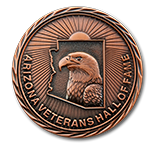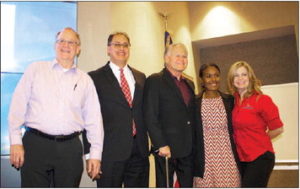From Surprise Today Apr. 25, 2018
By Randy Miller
SPECIAL TO INDEPENDENT NEWSMEDIA
From left, Judge Richard Maxon, Judge Mitchell Kaluali, Judge Rick Romely, Kelly Mills, manager of the Military and Veterans Success Center at Luke Air Force Base, and Lake Havasu Veteran’s Court coordinator Colene Lowery meet April 13 at Arizona State University West, 4701 W. Thunderbird Road, Glendale, for an informative session on the benefits of a proposed veteran’s court in the West Valley. [Randy Miller/Special to Independent Newsmedia]
A group of veterans participated in an informative session on the benefits of a veteran’s court in the West Valley at an April 13 meeting at Arizona State University West, 4700 W. Thunderbird Road, Glendale.
The goal of a veteran’s court is to rehabilitate and restore veterans who have gotten into legal trouble as active, contributing members of their community.
Judge Rick Romley, Judge Richard Gregg Maxon and Judge Mitchell Kalauli were on hand to discuss the benefi ts of a West Valley Veteran’s court. Armed with facts, statistics and some heartwarming stories of the extreme benefits of veteran’s court, the three judges made presentations to the assembly. To reinforce the information presented, RimaAnn Nelson, director of the Phoenix Veterans Affairs Center, was on hand to explain how they too assist in the veteran’s court process. A graduate of the veteran’s court then told his story and how the veteran’s court changed and, he believes, saved his life followed by a question and answer period.
The idea of a veteran’s court is not to give a free ride to a vet, Mr. Maxon said.
“For most of these guys, paying the fine and going to jail for a couple of days is the easy way,” he said. “But when I make them go through a 6-month substance abuse treatment, then six months’ worth of domestic violence treatment and counseling and then, if we have anything else on top of that, it adds up. It takes a real commitment to get through this.”
Mr. Romley, a Marine himself, understands the difficulty of transitioning to civilian life, but points out that many of the veterans he works with have been “out” for many years.
“Veteran’s court generally deals with lower level quality of life issues,” he said. “And I will tell you, if you want, in your particular community to impact crime, impact and improve the quality of your community’s life, the veteran’s court is the way to go” Veteran’s court is not just a function of overworked court staff, but a collaboration of veteran’s service organizations, social services, law enforcement, the judge, the prosecutor, the defense counsel and even the VA.
All veteran’s courts are different, Mr. Maxon said. Veteran’s court is a voluntary program, it does not deal with contested cases. It is a therapeutic court where vets are assessed and directed to appropriate treatments.
Mayors and city councilmembers from all West Valley cities were invited to attend the presentation. Hopes were high for attendance as it is well known that the West Valley holds their veteran’s population in high esteem. However, not one mayor or councilmember was in attendance, thus missing the arguments presented that a West Valley veteran’s court will ultimately save cities money, not cost them, and will improve the quality of life not only for the treated veteran, but for their family and everyone that veteran subsequently comes into contact with.
There are currently four veteran’s courts that work in the Valley — one in Phoenix, one in Mesa, an East Valley veteran’s court and a Maricopa County veteran’s court. For more information on available veteran’s court services, visit vcmproject.org or dvs.az.gov/veterans-court.
Editor’s note: Mr. Miller photographs and writes for the Glendale Daily Planet.


